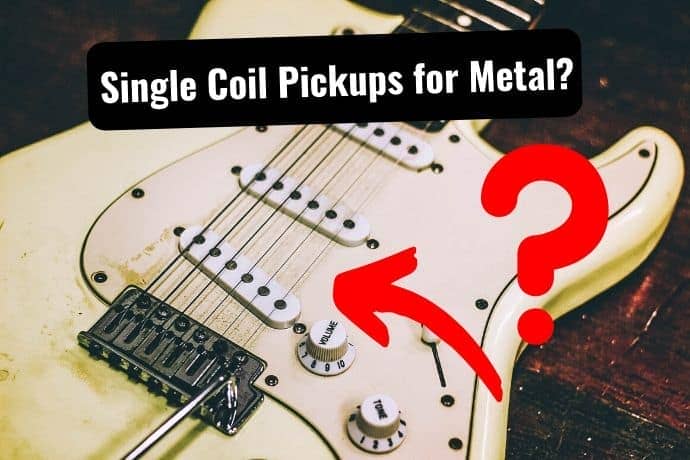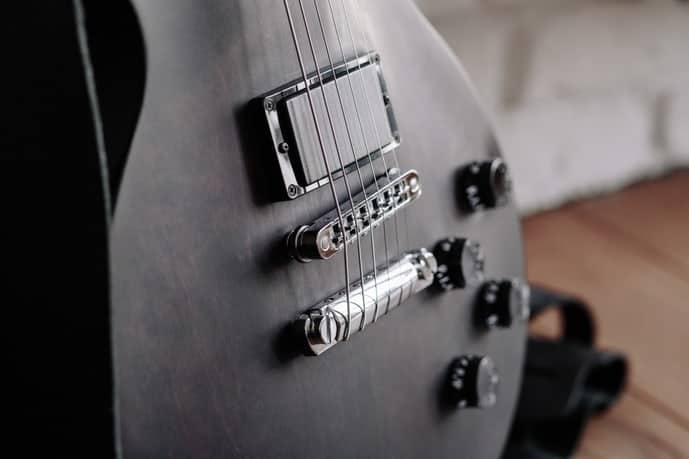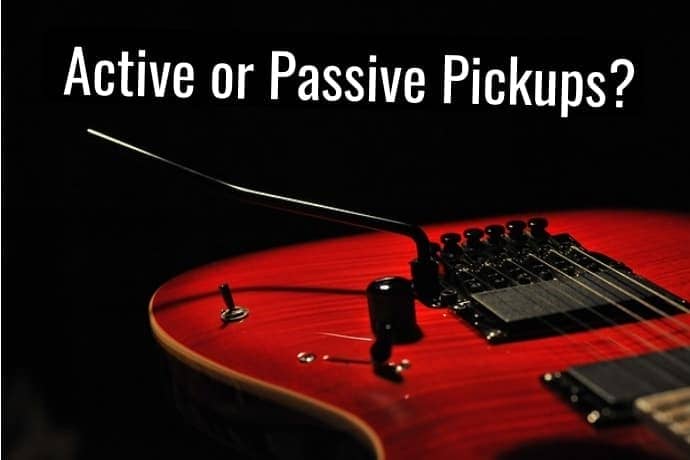
So you want to play the distorted and heavy sound of? But can a guitar installed with single-coil pickups be worthy of playing metal?
With my experience of experimenting with various pickups being: humbuckers, P90s, and single coils. This post will teach you whether a guitar with single coils can pull off this heavy and aggressive tone. Let’s dive in..
So are single-coil pickups ideal for playing metal?
There is no reason why you cant! However, single-coil pickups with distortion sound thin, brittle, and ‘harsh’ even with extensive EQ. They also cannot cancel the ’60 cycle hum’ and ‘buzz’ when combined with saturated distortion hence why humbuckers are traditionally preferred for metal.
Video Explanation (Watch Below)
Why Single Coils are Traditionally Not Metal Pickups
When it comes to tone, single-coil pickups are recognized for sounding “bright“, “piercing“, and “spanky“.
This tone is what gives iconic guitars such as the Fender Stratocaster and Fender Telecaster their thin and twangy tone.
Hence why single coils are popular with players familiar with lighter sounding genres such as blues, rock, country, jazz, pop, and many more.
However, metal is notably famed for sounding heavy and aggressive, with guitar tones familiarly loaded with a ton of distortion and saturation.
This is where single-coil pickups are not within their usual territory and somewhat a fish out of water. Notably for two reasons.
The Single Coil Tone for Metal
As mentioned, single-coils are notably thin and bright, excellent for shimmering cleans, mild crunch, and warm overdrive with a definition.
However, when you overload single-coils with a heap of distortion, the naturally bright and thin tone goes against them when parked in the metal player territory.
Overloading a guitar with single coils with gain and distortion, the tone is notably ‘thin,’ ‘brittle’ and very ‘harsh’ on the ears.
The reason is these pickups enhance the high frequencies and does not carry much bass as they are as the name suggests, they are a single-coil pickup compared to a humbucker (double coil design.)
When it comes to lead playing, riffs and single-note solos, single-coils with distortion are generally ok and doable.
However, chunky power chords or open chords with drop tunings are where the problem lies.
These pickups cannot achieve fat and chunky bottom-end tones that metal players love. They do not offer enough low frequencies and over pronounce the treble.
Hum and Feedback Issues with Single Coils
The second problem with this pickup choice for playing metal is noise, hum, and feedback problems.
As mentioned, the single-coil pickup is as the name suggests, is a single-coil design as opposed to the humbucker pickup being a double coil design.
A humbuckers double coil design effectively cancels ’60-cycle hum’ being noise, buzz, and feedback more effectively than single coils.
When you add a ton of distortion to a single-coil pickup, which is naturally noisy, your guitar is more likely to feedback and generate unwanted noise in the form of buzz and feedback.
This is not so much a problem for bedroom level playing. However, playing through a loud tube amp for gigging volumes, then a single-coil guitar is more likely to feedback, which will not sound professional and annoy your audience in the process.
There are methods to tame noise by ensuring your pickups are shielded and using quality cables.
And when it comes to feedback, adopt a noise gate pedal within your live rig to help stomp out pesky feedback or stand further away from your guitar.
A pickup unable to cancel its own noise and interference is not the ideal fit for a guitar that is being prominently used for heavy and saturated tones drenched in gain.
Why Humbuckers are The Staple Metal Pickup

The humbucker was invented by Seth Lover back in the 1950s. The main function was to offer players a guitar that did not produce as much noise and interferance as single coils.
Humbuckers have been the staple and traditional option for metal players over the decades for a good reason.
Humbuckers sound naturally thick, beefy, and dark compared to single-coils having twice as many pickups. More pickups equal a fatter tone.
This tone allows players to achieve that wide bottom-end sound ideal for chugging and playing down-tuned notes favorable with modern metal genres.
Single Coil vs Humbucker Metal Shootout! (Watch Below)
EMG or’ active pickups’ are popular with metal players as they have an internal preamp that provides additional gain providing a ‘hotter’ signal to the amp. Compared to a single-coil that produces a low output signal.
A hotter signal pushes the amp’s tubes further for more gain and aggression. Active pickups are also designed to be virtually silent, giving players an amp free from unwanted hum and buzz.
Passive pickups are also great at this as most humbuckers are close to silent with effective pickup shielding and optimal set up for metal.
The only downside to humbuckers is the lack of bright shimmering cleans usually produced by the traditional single coils.
On the other hand, considering metal players will be using a heavy distorted tone 70%-90% of the time, this is a small drawback.
How to Get a Metal Tone From a Single-Coil
Although I have discussed the reason why single coils are not ideal for metal.
If you want to achieve a decent metal tone with single coils this is the best practice to go by. After all, the tone is subjective, and it is an excellent way to practice your EQ skills and train your ear in the process.
Gain/Dirt Section
Depending on whether your gain comes from your amp or pedals, do not oversaturate the tone. Add enough gain for metal territory allowing for as little gain you can get away with.
If your gain comes from your distortion or overdrive pedal even better! You will want to roll back the tone knob available to some select pedals.
This is to lower the gains treble adding thickness meat and less harsh frequencies to your distortion section.
How to EQ your Amp
Amp EQ is the most crucial factor here. You will want to increase the bass control to add thickness to the tone while lowering the treble to remove the sparkling highs.
The pronounced highs are what give you the brittle and thin frequencies, so you will want to lower them massively. The mids are less essential but you have to tweak and adjust to see what sounds the best to your ears.
Noise Gate
A noise gate is handy for cleaning up your signal and removing buzz and pesky noise from single-coils with a ton of heavy distortion. Tweak your gate settings just enough, so the pedal filters all the noise and interference from your signal.
Pickup Selection
Depending on your pickups you will want to avoid the bridge pickup as this is the brightest pickup you can choose.
For this reason, choose the middle or neck pickup as they will provide a warmer and thicker sound.
You will also want to tweak your tone knob to roll off the treble lowering the highs and providing a darker sound for metal.
Related Questions
Why are single-coil pickups noisy?
Single coils are noisy because they prominently pickup ‘Radio Interference’ (RF). Secondly, they are a single-coil design as opposed to a humbucker, which is a double coil design. The best practice to cancel hum and buzz is to shield your pickups cavity to reduce the interference.
What do noiseless pickups do?
Noiseless pickups are designed to fit a single-coil guitar but are stacked single-coil pickups that perform similar to a humbucker. This design is to eliminate hum and buzz problematic of single-coil pickups. However, they do not sound as bright and articulate as a regular single coil.
Thanks for Reading
With the knowledge of why humbuckers are generally superior for playing metal.
You must check out my related post… Active or Passive Pickups for Playing Metal!
It is my ultimate shootout guide comparing the differences between active and passive humbuckers for playing all genres of metal. Which one would you prefer installed in your guitar?

